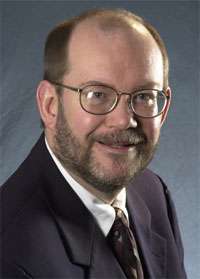Daniel A. Reed (computer scientist)
| Daniel A. Reed | |
|---|---|
 | |
| Residence | United States |
| Nationality | American |
| Fields | Computational Science |
| Institutions | Renaissance Computing Institute |
| Alma mater | Purdue University |
Daniel A. Reed is an American computational scientist, known for his contributions to high-performance computing[1] and science policy. He is vice president of research and economic development at the University of Iowa. He previously served as director of scalable computing and multicore at Microsoft Research. He founded the Renaissance Computing Institute in 2004 and served as its director until December 2007. Reed also was Chancellor’s Eminent Professor and served as senior adviser for strategy and innovation to UNC-Chapel Hill Chancellor James Moeser. He served as CIO and Vice Chancellor for Information Technology Services at UNC-Chapel Hill from June 2004 through April 2007.
He was appointed to the President’s Council of Advisors on Science and Technology (PCAST), by President Bush in 2006 and served on the President’s Information Technology Advisory Committee (PITAC) from 2003–2005. As chair of PITAC’s computational science subcommittee, he was lead author of the report “Computational Science: Ensuring America’s Competitiveness.” On PCAST, he co-chairs the Networking and Information Technology subcommittee (with George Scalise of the Semiconductor Industry Association) and recently co-authored a report on the National Coordination Office’s Networking and Information Technology Research and Development (NITRD) program called “Leadership Under Challenge: Information Technology R&D in Competitive World.” He is also a member of PCAST’s Personalized Medicine subcommittee.
Reed has been chair of the Board of Directors of the Computing Research Association (CRA) since 2005 and a member of the board since 1998. CRA represents the research interests of the university, national laboratory and industrial research laboratory communities in computing across North America.
Biography
Reed earned a B.S. from the University of Missouri, Rolla, and an M.S. and Ph.D from Purdue University, all in computer science.
Before coming to North Carolina, Reed spent 19 years at the University of Illinois at Urbana-Champaign, where he led the National Center for Supercomputing Applications (NCSA) from 2000–2003 and chaired the University of Illinois computer science department, one of the top five departments in the country, from 1996–2001. During his tenure in the CS department and at NCSA, he was instrumental in securing more than $100 million in public and private funds, which led to the development of the Thomas M. Siebel Center for Computer Science and the first permanent home for NCSA. The two buildings now anchor the university’s information technology quadrangle.
In 2001, Reed led the effort to launch the National Science Foundation’s TeraGrid, the world's largest, most comprehensive distributed cyberinfrastructure for open scientific research, and then served as TeraGrid chief architect through 2003. Through the TeraGrid, as one of the principal investigators of the NSF’s Partnerships for Advanced Computational Infrastructure (PACI) program, and as director of NCSA, Reed was instrumental in deploying some of the first Linux cluster supercomputers for scientific computing. These commodity-based systems are now a mainstay of high performance scientific computing.
Research focus
Reed’s research focuses on the design of very high-speed computers, providing new computing capabilities for scholars in science, medicine, engineering and the humanities, tools and techniques for capturing and analyzing the performance of parallel systems, and collaborative virtual environments for real-time performance analysis. He led the Pablo Research Group, which investigates the interaction of architecture, system software, and applications on large-scale parallel and distributed computer systems. The group created SvPablo, a graphical environment for instrumenting application source code and browsing dynamic performance data. Key research foci of the group included exploration of performance analysis techniques and compiler-aided scalability analysis, scalable parallel file systems, and real-time adaptive systems for resource policy control.
Reed is a frequent speaker on these research topics and also speaks on the role of technology in innovation, economic development and government, and the future of computing and technology.
Professional experience
- Post-doctoral Research Associate, Purdue University, May 1983-August 1983
- Assistant Professor, University of North Carolina at Chapel Hill, August 1983-July 1984
- Assistant Professor, University of Illinois at Urbana-Champaign, August 1984-August 1988
- Associate Professor, University of Illinois at Urbana-Champaign, August 1988-August 1991
- Professor, University of Illinois at Urbana-Champaign, August 1991 – 2003
- Edward William and Jane Marr Gutgsell Professor, University of Illinois, 2000–2003
- Senior Research Scientist, National Center for Supercomputing Applications, 1995–2000
- Head, Department of Computer Science, University of Illinois, May 1996 – 2001
- 2000 students, 40 faculty and 100 staff
- Director, National Computational Science Alliance, March 2000 – 2003
- 50 institution national partnership, funded by NSF
- Director, National Center for Supercomputing Applications, September 2000 – 2003
- 250 staff and $80M annual budget
- Chief Architect, NSF Extensible Terascale Facility TeraGrid, 2001–2003
- Chancellor’s Eminent Professor, University of North Carolina at Chapel Hill, 2004–2007
- Director, Renaissance Computing Institute, 2004–2007
- statewide research, outreach and economic development
- Vice-Chancellor for Information Technology, University of North Carolina at Chapel Hill, 2004–2007
- 600 staff and $60M annual budget
- Vice President for Research and Economic Development, University of Iowa, 2012–present
References
- ↑ Foster, Ian; Kesselman, Carl (2004). The grid: blueprint for a new computing infrastructure. Morgan Kaufmann. pp. 460–. ISBN 978-1-55860-933-4. Retrieved 8 May 2011.
External links
| Wikimedia Commons has media related to Daniel A. Reed (computer scientist). |
- Reed's Ruminations, Dan Reeds Blog
- RENCI website
- PCAST
- PITAC
- NITRD
- CRA
- Pablo Research Group
- whereisdanreed.com, a UNC student-run lampoon of Dan Reed